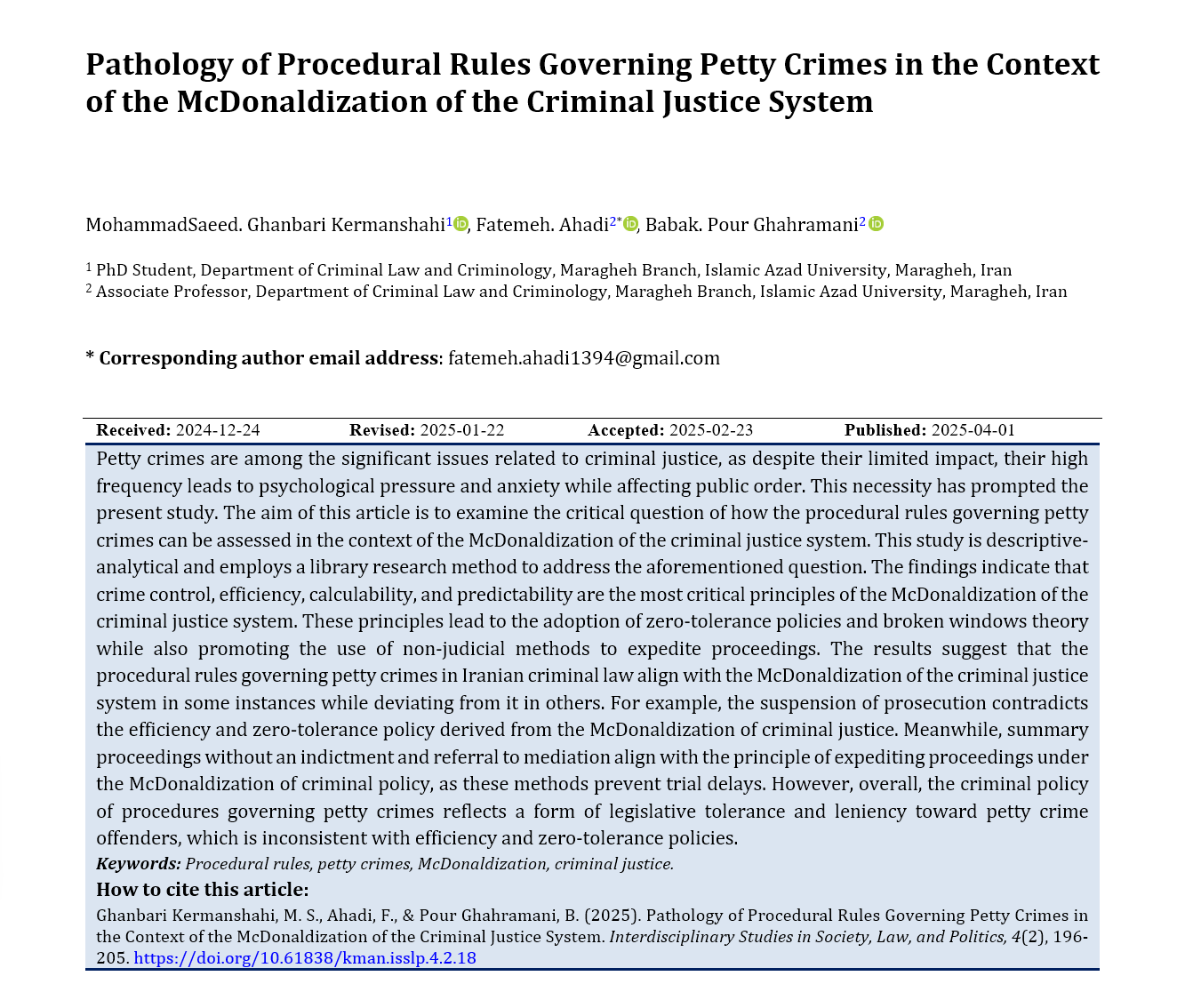Pathology of Procedural Rules Governing Petty Crimes in the Context of the McDonaldization of the Criminal Justice System
Keywords:
Procedural rules, petty crimes, McDonaldization, Criminal JusticeAbstract
Petty crimes are among the significant issues related to criminal justice, as despite their limited impact, their high frequency leads to psychological pressure and anxiety while affecting public order. This necessity has prompted the present study. The aim of this article is to examine the critical question of how the procedural rules governing petty crimes can be assessed in the context of the McDonaldization of the criminal justice system. This study is descriptive-analytical and employs a library research method to address the aforementioned question. The findings indicate that crime control, efficiency, calculability, and predictability are the most critical principles of the McDonaldization of the criminal justice system. These principles lead to the adoption of zero-tolerance policies and broken windows theory while also promoting the use of non-judicial methods to expedite proceedings. The results suggest that the procedural rules governing petty crimes in Iranian criminal law align with the McDonaldization of the criminal justice system in some instances while deviating from it in others. For example, the suspension of prosecution contradicts the efficiency and zero-tolerance policy derived from the McDonaldization of criminal justice. Meanwhile, summary proceedings without an indictment and referral to mediation align with the principle of expediting proceedings under the McDonaldization of criminal policy, as these methods prevent trial delays. However, overall, the criminal policy of procedures governing petty crimes reflects a form of legislative tolerance and leniency toward petty crime offenders, which is inconsistent with efficiency and zero-tolerance policies.
Downloads
References
Akhondi, M. (1999). The Judiciary's Approach to Petty Crimes. Journal of Legal and Judicial Affairs of the Ministry of Justice, 64(31), 13-18.
Ashouri, M. (2015). Criminal Procedure, Volume 1 (18th ed.). Samt Publications.
Clarkson, C. M. (1995). An Analysis of the Principles of Criminal Law (H. Mirmohammad Sadeghi, Trans.). Shahid Beheshti University Press.
Clear, T. R. (2000). American Corrections, 6 th ed. Wadsworth Publishing Company.
Dixon, D. (2003). Beyond zero tolerance.
Esfandiari, M. S., & Nourpour, M. (2017). Consequences and Challenges of Criminal Tolerance in Petty Crimes. Detective Magazine, 9(39), 56-76.
Gholami, H. (2005). Restorative Justice (3rd ed.). Samt Publications.
Gholami, H., & Babaei, Y. (2010). The McDonaldization of Criminal Justice. Journal of Justice Law, 70(74), 153-186.
Grabosky, P. N. (1999). Zero Tolerance Policing(trends& issues in crime and criminal justice),5th ed.
Kelling, G. L., & Coles, C. M. (1996). Fixing Broken Windows Restoring Order & Reducing Crime in Our Communities,2th ed. Simon & Schuster.
Khaleghi, A. (2015). Criminal Procedure, Volume 1 (27th ed.). Shahr-e-Danesh Publications.
Koushki, G. (2010). Alternatives to Public Prosecution in the Criminal Procedure System of Iran and France. Journal of Public Law Research, 12(29), 327-350.
Mesgarani Torghabeh, M. (2003). Urban Crimes and the Need for Preventive Policy-Making. Journal of Legal and Judicial Affairs of the Ministry of Justice, 64(33), 134-167.
Mohammad Beigi Khortaei, A. (2013). The Prosecutor and Social Security (1st ed.). Mizan Publications.
Mohammad Nasl, G. (2015). The Nature of Petty Crimes (1st ed.). Iran Newspaper Publishing.
Mosaddegh, M. (2016). An Explanation of the Islamic Penal Code of 2013 with a Practical Approach (3rd ed.). Jangal/Javidaneh Publications.
Najafi Abrand Abadi, A. H. (1999). Lectures on Criminal Policy (1st ed.). Shahid Beheshti University Press.
Norouzi, N. (2005a). Criminal Policy Towards Petty Crimes and its Impact on Citizens' Sense of Security, with Emphasis on the Broken Windows Theory (Doctoral dissertation, University of Tehran, Faculty of Law and Political Science)
Norouzi, N. (2005b). Petty Crimes Against Public Order. Journal of the Faculty of Law and Political Science, University of Tehran, 68(517), 257-277.
Packer, H. (1968). The limits of the criminal sanction,1th ed. Stanford University Press.
Rietzer, G. (2004). The McDonaldization of society,1th ed. Forge Press.
Wilson, J. Q. (1997). Policing zera tolerance & the broken windows theory- workshop presentation, 1th ed.

Downloads
Additional Files
Published
Submitted
Revised
Accepted
Issue
Section
License
Copyright (c) 2025 Interdisciplinary Studies in Society, Law, and Politics

This work is licensed under a Creative Commons Attribution-NonCommercial 4.0 International License.





